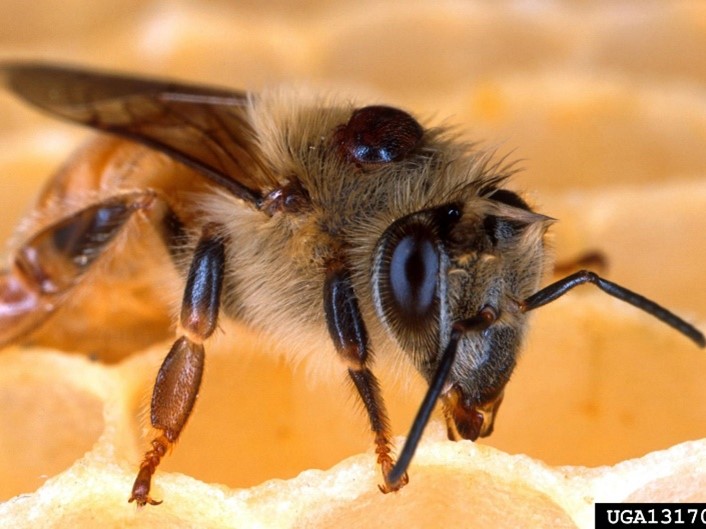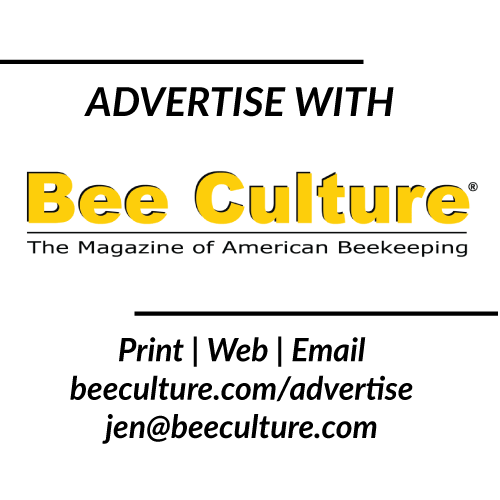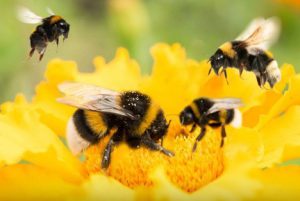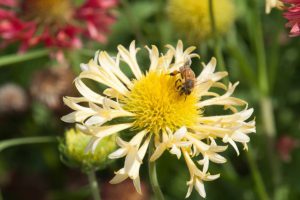Penn State Extension educator secures grant to aid honey bees and beekeeping

A European honey bee with a parasitic varroa mite on its back. A newly funded program planned by a Penn State Extension educator will help beekeepers learn queen rearing and artificial insemination techniques that could help in breeding bees resistant to varroa mites. Credit: Scott Bauer, USDA Agricultural Research Service, Bugwood.org. All Rights Reserved.
By Alexandra McLaughlin
A $217,000 grant from the U.S. Department of Agriculture’s Northeast Sustainable Agriculture Research and Education program will enable Robyn Underwood, apiculture educator with Penn State Extension, to develop an extension program on honey bee queen rearing and artificial insemination.
“Honey bees are the most important managed pollinator,” Underwood said. “We need honey bees to help provide high crop yields and a variety of food. One in every three bites of food is due to pollination from honey bees.”
The extension program will provide long-term learning opportunities, including regular lunch-and-learn sessions, online classes and written informational resources, structured educational forums, and in-person workshops. Organizers named the program “EPIQ,” which stands for education about production and insemination of queens.
Underwood said she expects a competitive application process to result in a cohort of about 100 experienced beekeepers participating in queen rearing education at no cost.
Queen rearing means that a beekeeper can boost profits by raising extra queens to sell to other beekeepers, Underwood explained. She aims to increase self-reliance of beekeepers in the Northeast. “The beekeeping community relies on California and Georgia for a lot of our queens,” she said. “We would rather rely less on imports and be more self-sustaining.”
Participants will learn about the anatomy and biology of queens, workers and drones; data collection to select the best bees for breeding; proper care for colonies; techniques to rear queens and drones; and the importance of nutrition.
A select subgroup of participants will receive the training and equipment needed to provide artificial insemination services.
“Artificial insemination is highly advanced and technical,” Underwood said. “Our goal is to have one person in each state who can provide that as a service. Any nearby beekeeper can come to them for controlled breeding.”
Underwood noted that bees normally fly off and mate randomly. Artificial insemination allows beekeepers to mate queens with drones from the best colonies to improve genetic traits. In the long term, selective breeding could help address the biggest problem in the beekeeping industry — the parasitic varroa mite.
“People liken varroa mites on bees to having a tick the size of a dinner plate on your body,” Underwood said. “They pierce the bees and transmit deadly viruses.”
Breeding programs can help bees become genetically resistant to varroa mites, decreasing the need for beekeepers to use mite-killing chemicals in hives.
Underwood explained that the grant will generate learning opportunities to help beekeepers move toward breeding programs, but that breeding programs are not the focus of the award. She expects the grant to last through at least 2025.
The funding will enable Underwood to create intermediate and advanced online beekeeping classes that build upon Beekeeping 101, the beginner course offered through Penn State Extension.
Underwood will partner on the project with Kate Anton, an apiculture technician in the Center for Pollinator Research in Penn State’s College of Agricultural Sciences; other professionals skilled in queen rearing and insemination; and a network of stakeholders in the Northeast.
Funded by USDA’s National Institute of Food and Agriculture, Northeast SARE offers grants and education to farmers, educators, service providers, researchers and others to address key issues affecting the sustainability of agriculture throughout the Northeast.





